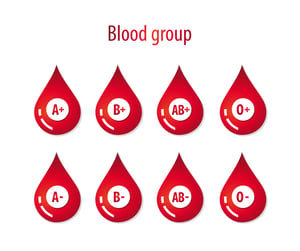Share this
coronavirus & blood type: does it influence your COVID-19 immunity?
by Neoteryx Microsampling on Sep 28, 2020 9:00:00 AM
 Recent studies show that people with type A blood may be more susceptible to COVID-19 illness than those with other blood types. Researchers in China reached this conclusion after studying 2,173 patients that had been treated in three Shenzhen and Wuhan hospitals for COVID-19, the illness caused by the SARS-CoV-2 virus.
Recent studies show that people with type A blood may be more susceptible to COVID-19 illness than those with other blood types. Researchers in China reached this conclusion after studying 2,173 patients that had been treated in three Shenzhen and Wuhan hospitals for COVID-19, the illness caused by the SARS-CoV-2 virus.
The researchers looked at the distribution of blood types in the population of both cities and compared it with patients who had contracted the virus. Wuhan’s average population had a blood type distribution of 34% type O, 31% type A, 24% type B, and 9% type AB.
By comparison, those with the virus were distributed as follows: 38% type A, 26% type B, 25% type O, and 10% type AB. The statistics show that the greatest percentage of people who contracted the virus had type A blood.
Another study involving a review of medical records of 7,770 people that had tested positive for the SARS-CoV-2 virus found that those with:
- Type A blood were less likely to use/need a ventilator
- Type AB blood were more likely to use/need a ventilator
- Type O blood had a lower risk of contracting the virus
Do these study results mean that those with blood type O have some innate immunity to COVID-19? Not necessarily. These investigations were only preliminary and haven’t been peer-reviewed.
Correlation Between Blood Type and COVID-19
Scientists maintain that there isn't a strong enough connection between a person’s blood type and COVID-19 to consider blood type as a risk factor for contracting the virus. A possible correlation indicated by preliminary studies is tied to how different blood types develop antibodies as a patient’s immune system fights infection.
Typically, blood types are categorized based on the type of antigens contained in the blood. Blood is categorized as type A, B, AB, or O. When antigens come into contact with foreign substances, they trigger a response from the immune system. Such responses have been observed in medicine for some time. For example, problems have been seen during blood transfusions when the donor’s blood type doesn’t match the recipient’s.
Certain viruses appear to exploit the differences in blood cell antigens. For example, the norovirus infects people through the digestive system and needs specific antigens to “latch-on.” This may account for the difference in susceptibility to catching a virus.
A similar analogy can be used to explain the difference in COVID-19 infections in people with blood type A as opposed to other blood groups.
Blood type affects health in other ways beyond susceptibility to contracting viruses. Here are three ways that blood type can impact health:
1. Developing Heart Disease
Certain blood types have a higher risk of developing heart disease than others. People with blood type O have the lowest risk for heart disease. People with blood types AB and B have the greatest risk for developing heart disease. This is thought to be because these blood types typically have higher rates of inflammation. A heart-healthy lifestyle can be helpful for people with types AB and B blood.
2. Different Types of Cancer
Blood types are also associated with different types of cancer. People with type A blood, for example, are more likely to develop stomach cancer than those with other blood types. The first notable study of this correlation can be traced back to 1953 when ABO blood-group distributions of 3,632 patients with gastric cancer were studied.
The researchers found a 20% increase in carcinoma of the stomach in patients with type A blood in comparison with the type O group of individuals. Another study conducted in 1961 found a positive correlation between blood group A and the risk of contracting stomach cancer.
Additional research shows that the ABO gene also increases the risk of developing other types of cancers, including liver, lung, breast, prostate, and cervical cancers. Most of these studies were performed using previous medical records that involved traditional blood collection methods (wet blood collection) instead of dried blood spot techniques.
3. Memory Loss and Brain Function
One study connects an individual’s blood type to an increased risk of developing memory loss. While people with blood type AB constitute the smallest percentage of the global population (4% in the US), 82% of people in the AB blood type group were more likely to develop cognition and memory problems.
A possible reason for this phenomenon is that blood type is associated with health conditions such as diabetes, high blood pressure, and high cholesterol, which are associated with cognitive impairment.
Further studies are needed to determine correlations between blood type and risk factors for disease. Future studies may utilize remote blood collection methods, such as the Mitra® device with VAMS technology. Using remote blood sampling methods helps to expand the pool of study participants and, thus, gather more data.
For remote studies, participants can use the Mitra microsampling device at home to self-collect blood samples that can be mailed to the lab for testing. Researchers then analyze the dried blood samples to gather data. The data furnished by dried blood samples is typically either concordant with "wet" blood samples or can be correlated to traditional reference ranges.
The benefit of remote blood collection and dried blood analysis is that it eliminates the need for onsite facility visits and risky exposure to COVID-19 or other contagions. For future studies concerning blood types and viral immunity, researchers are likely to embrace remote sampling.
Because the findings regarding a possible correlation between blood types and immunity to COVID-19 are not conclusive, we should not assume that people of certain blood groups are more susceptible to the virus than others. What is known at this time, is that there are two factors that significantly increase the risk of contracting the virus:
- An individual’s age (older people have a higher risk)
- Underlying health conditions like cancer, chronic kidney disease, obesity, Type 2 diabetes, heart conditions, and sickle cell disease
Share this
- Microsampling (206)
- Research, Remote Research (119)
- Venipuncture Alternative (105)
- Clinical Trials, Clinical Research (83)
- Mitra® Device (73)
- Therapeutic Drug Monitoring, TDM (51)
- Dried Blood Spot, DBS (39)
- Biomonitoring, Health, Wellness (30)
- Infectious Disease, Vaccines, COVID-19 (24)
- Blood Microsampling, Serology (23)
- Omics, Multi-Omics (21)
- Decentralized Clinical Trial (DCT) (20)
- Specimen Collection (18)
- Toxicology, Doping, Drug/Alcohol Monitoring, PEth (17)
- Skin Microsampling, Microbiopsy (14)
- hemaPEN® Device (13)
- Preclinical Research, Animal Studies (12)
- Pharmaceuticals, Drug Development (9)
- Harpera Device (7)
- Industry News, Microsampling News (5)
- Antibodies, MAbs (3)
- Company Press Release, Product Press Release (3)
- Environmental Toxins, Exposures (1)
- July 2025 (1)
- May 2025 (1)
- April 2025 (2)
- December 2024 (2)
- November 2024 (1)
- October 2024 (3)
- September 2024 (1)
- June 2024 (1)
- May 2024 (1)
- April 2024 (4)
- March 2024 (1)
- February 2024 (2)
- January 2024 (4)
- December 2023 (3)
- November 2023 (3)
- October 2023 (3)
- September 2023 (3)
- July 2023 (3)
- June 2023 (2)
- April 2023 (2)
- March 2023 (2)
- February 2023 (2)
- January 2023 (3)
- December 2022 (2)
- November 2022 (3)
- October 2022 (4)
- September 2022 (3)
- August 2022 (5)
- July 2022 (2)
- June 2022 (2)
- May 2022 (4)
- April 2022 (3)
- March 2022 (3)
- February 2022 (4)
- January 2022 (5)
- December 2021 (3)
- November 2021 (5)
- October 2021 (3)
- September 2021 (3)
- August 2021 (4)
- July 2021 (4)
- June 2021 (4)
- May 2021 (4)
- April 2021 (3)
- March 2021 (5)
- February 2021 (4)
- January 2021 (4)
- December 2020 (3)
- November 2020 (5)
- October 2020 (4)
- September 2020 (3)
- August 2020 (3)
- July 2020 (6)
- June 2020 (4)
- May 2020 (4)
- April 2020 (3)
- March 2020 (6)
- February 2020 (3)
- January 2020 (4)
- December 2019 (5)
- November 2019 (4)
- October 2019 (2)
- September 2019 (4)
- August 2019 (4)
- July 2019 (3)
- June 2019 (7)
- May 2019 (6)
- April 2019 (5)
- March 2019 (6)
- February 2019 (5)
- January 2019 (8)
- December 2018 (3)
- November 2018 (4)
- October 2018 (7)
- September 2018 (6)
- August 2018 (5)
- July 2018 (8)
- June 2018 (6)
- May 2018 (5)
- April 2018 (6)
- March 2018 (4)
- February 2018 (6)
- January 2018 (4)
- December 2017 (2)
- November 2017 (3)
- October 2017 (2)
- September 2017 (4)
- August 2017 (2)
- July 2017 (4)
- June 2017 (5)
- May 2017 (6)
- April 2017 (6)
- March 2017 (5)
- February 2017 (4)
- January 2017 (1)
- July 2016 (3)
- May 2016 (1)
- April 2016 (2)



No Comments Yet
Let us know what you think